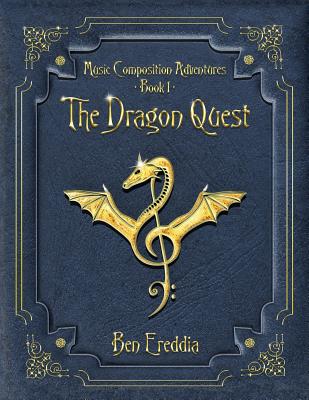The Dragon Quest: A Music Composition Adventure

The Dragon Quest: A Music Composition Adventure
You are about to go on an adventure in a land where music is magic and you must compose to complete the quests that are laid out before you.The Dragon Quest is a delightful introduction to music composition.A magical musician is looking for an apprentice until he finds you. If you are willing, he will send you on an adventure that will require you to compose music of your own to overcome challenges and complete your mission.The Dragon Quest contains several easy music composition exercises that will give students a solid introduction to the magical world of music composition.In addition to teaching composition, the story in this book explores concepts such as musicianship, courage, perspective taking and smart practice. Through the use of stories, students engage with these ideas and take ownership of these concepts.No matter what your instrument or your age, The Dragon Quest is sure to become one of your favorite music instruction books of all time.What instruments can use Music Composition Adventures?There are specific instructions for 19 of the most common instruments: Piano, Recorder, Guitar, Flute, Oboe, Clarinet, Saxophone, Bassoon, French Horn, Trumpet, Trombone, Baritone, Euphonium, Tuba, Pitched Percussion (Marimba, xylophone, etc.), Violin, Viola, Cello and Bass. Unless you play in a gamelan ensemble or you play some other obscure, non-western, musical instruments, if your instrument is not on this list, you should have no trouble following the instructions for another instrument. Why should students compose? Composing music is a creative form of self expression that is fun and rewarding. Composers take ownership of their own musical creativity. Suddenly, music has a whole new component, one in which they are the creators. Composing music helps with ear training (being able to play what one hears). An understanding of the composition process helps students understand the works of other composers. When students compose, they make decisions about their musical preferences. Composing music helps develop musical memory. Why should students write music on a page? The process of writing music on a page is an excellent way to deepen a students understanding of music notation. Putting pencil to paper creates a connection to the details of music notation and their function. It gives real world experience with elements of music that are often only conceptualized or worse, overlooked. What age is Music Composition Adventures intended for? Ages 6 and u
PRP: 80.29 Lei
Acesta este Prețul Recomandat de Producător. Prețul de vânzare al produsului este afișat mai jos.
64.23Lei
64.23Lei
80.29 LeiIndisponibil
Descrierea produsului
You are about to go on an adventure in a land where music is magic and you must compose to complete the quests that are laid out before you.The Dragon Quest is a delightful introduction to music composition.A magical musician is looking for an apprentice until he finds you. If you are willing, he will send you on an adventure that will require you to compose music of your own to overcome challenges and complete your mission.The Dragon Quest contains several easy music composition exercises that will give students a solid introduction to the magical world of music composition.In addition to teaching composition, the story in this book explores concepts such as musicianship, courage, perspective taking and smart practice. Through the use of stories, students engage with these ideas and take ownership of these concepts.No matter what your instrument or your age, The Dragon Quest is sure to become one of your favorite music instruction books of all time.What instruments can use Music Composition Adventures?There are specific instructions for 19 of the most common instruments: Piano, Recorder, Guitar, Flute, Oboe, Clarinet, Saxophone, Bassoon, French Horn, Trumpet, Trombone, Baritone, Euphonium, Tuba, Pitched Percussion (Marimba, xylophone, etc.), Violin, Viola, Cello and Bass. Unless you play in a gamelan ensemble or you play some other obscure, non-western, musical instruments, if your instrument is not on this list, you should have no trouble following the instructions for another instrument. Why should students compose? Composing music is a creative form of self expression that is fun and rewarding. Composers take ownership of their own musical creativity. Suddenly, music has a whole new component, one in which they are the creators. Composing music helps with ear training (being able to play what one hears). An understanding of the composition process helps students understand the works of other composers. When students compose, they make decisions about their musical preferences. Composing music helps develop musical memory. Why should students write music on a page? The process of writing music on a page is an excellent way to deepen a students understanding of music notation. Putting pencil to paper creates a connection to the details of music notation and their function. It gives real world experience with elements of music that are often only conceptualized or worse, overlooked. What age is Music Composition Adventures intended for? Ages 6 and u
Detaliile produsului









